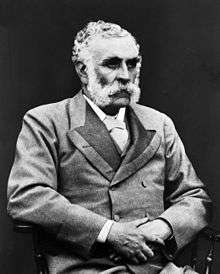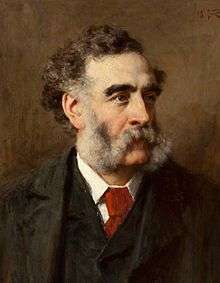Douglas Argyll Robertson
Dr Douglas Moray Cooper Lamb Argyll Robertson FRSE, FRCSEd LLD (1837 – 3 January 1909) was a Scottish ophthalmologist and surgeon. He introduced physostigmine into ophthalmic practice and the Argyll Robertson pupil is named after him. He was president of the Royal College of Surgeons of Edinburgh.[1]


Early life
He was born at 58 Queen Street[2] in Edinburgh in 1837, the son of Dr John Argyll Robertson, a surgeon with an interest in surgery of the eye who had served as President of the Royal College of Surgeons of Edinburgh in 1846.[3] His older brother, C. Lockhart Robertson was an eminent psychiatrist and Lord Chancellor's medical visitor.[4] Argyll Robertson was educated at the Edinburgh Institution and at Neuwied in Germany going on to study medicine at the Universities of Edinburgh and St Andrews.[5]
Career
After graduating MD in 1857 from the University of St Andrews, he was appointed house surgeon at the Royal Infirmary of Edinburgh before going to Prague to study ophthalmology under Carl Ferdinand von Arlt (1812-1887) and then to Berlin to study under Albrecht von Graefe (1828–1870).[6] On return to Edinburgh he became assistant to Professor John Hughes Bennett, Professor of the Institutes of Medicine (physiology) at Edinburgh University. He then joined the Eye Dispensary which his father had helped to found, and qualified as Fellow of the Royal College of Surgeons of Edinburgh in 1862.[7] In 1867 he became assistant ophthalmic surgeon at Edinburgh Royal Infirmary under William Walker, and became senior surgeon in 1870 until he retired in 1897.[5] He was Lecturer on Diseases of the Eye in the University of Edinburgh.[8]
Effects of Calabar bean extract
Robertson made several contributions in the field of ophthalmology. The first was in 1863 when he researched the effects on the eye made by physostigmine, an extract from the Calabar bean (Physostigma venenosum), which is found in tropical Africa. Robert Christison, Professor of Materia Medica at Edinburgh University had in 1855 described the systemic effects of chewing a fragment of Calabar bean.[9] It had used for judicial execution in Eastern Nigeria. Dr (later Sir) Thomas Richard Fraser, an Edinburgh physician, who had in 1862 been awarded the gold medal for his MD thesis on possible medical uses,[10] drew Argyll Robertson’s attention to its property of constricting the pupil of the eye. In the company of two colleagues Robertson instilled an extract of Calabar bean first in his left eye, and later at a higher concentration into both eyes. As a result of this experiment he recommended that an extract, which contained the active ingredient, the alkaloid physostigmine, be used to reverse the action of atropine, which had been used in fundoscopy to dilate the pupil since Helmholtz’s introduction of the ophthalmoscope in 1851.[11] This was the first miotic agent to be used in ophthalmic practice. He correctly predicted that physostigmine would become very important in the treatment of eye disorders and it was later used in the treatment of glaucoma with Ludwig Laqueur's discovery in 1875 that it could lower the intraocular pressure.[12]
Argyll Robertson pupil
He also described a symptom of neurosyphilis that affects the pupils of the eye, a condition subsequently known as Argyll Robertson pupil. In 1869 he published a paper giving the first description of unusual reactions of the pupils to light and accommodation in patients with tabes dorsalis (syphilis affecting the spinal cord).[13] He describes small pupils which did not constrict response to stimulation with light but constricted normally during accommodation and convergence. The Argyll Robertson pupil became a pathognomonic sign for the diagnosis of syphilis affecting the central nervous system.
Trephine operation for glaucoma
Argyll Robertson was the first to publish a description of and results following a trephine operation for the treatment of glaucoma.[14] Creating a small hole in the sclera (anterior sclerotomy) to drain the aqueous humor, would, he reasoned, lower intraocular pressure. This principle still forms the basis for modern filtering surgical procedures for glaucoma.[15]
Sporting achievements
Argyll Robertson was a skilled golfer. He won the gold medal of the Royal and Ancient Golf Club of St Andrews on no fewer than five occasions (1865,1870,1871, 1872 and 1873), and the Gold medal of the Honourable Company of Edinburgh Golfers in 1870, 1874 and 1876.[5] It was said that his wife’s favorite item of jewelry was a necklace fashioned from her husband's golfing medals.[16] He was also a keen archer and, as a member of the Royal Company of Archers, the Royal bodyguard for Scotland, took part in their archery competitions.[5]
Honours
His honours included appointment as Surgeon Oculist in Scotland to Queen Victoria and subsequently to King Edward VII.[8] In 1872 he was elected a Fellow of the Royal Society of Edinburgh.[17] His proposer was Peter Guthrie Tait.
He was President of the Ophthalmological Society of Great Britain from 1893 to 1895, and was President of the International Ophthalmological Congress when it met in Edinburgh in 1894.[17] He was also President of the International Council for Ophthalmology, President of the section of ophthalmology of the British Medical Association. In addition he was a member of the Ophthalmological Society of Heidelberg and corresponding Fellow of the New York Academy of Medicine.[8] He was awarded an honorary Doctorate of Laws by Edinburgh University in 1896 and was President of the Royal College of Surgeons of Edinburgh from 1886 to 1887.[17]
Family, later years and death
In 1882 Argyll Robertson married Carey Fraser, fourth daughter of William Nathaniel Fraser of Findrack and Tornaveen, Aberdeenshire. They had no children.[3]
After retiring in 1904 he settled at Mon Plaisir, St Aubin, Jersey.
In 1892 and 1900 Argyll Robertson travelled to India to visit the Bhagvat Singh, Thakur of Gondal a former pupil at Edinburgh, who had become a personal friend. On a third visit in the winter of 1908–9 he died at Gondal, India, on 3 January 1909. He was cremated on the banks of the River Gondli. In an unusual gesture for a Maharaja, and as a token of the esteem in which he held Argyll Robertson, the Thakur sahib wore mourning robes and lit the funeral pyre of his guru and friend.[8]
Artistic recognition
His sketch portrait of 1884, by William Brassey Hole, shown arm-in-arm with Dr Thomas Clouston, is held by the Scottish National Portrait Gallery.[18]
References
- Waterston, Charles D; Macmillan Shearer, A (July 2006). Former Fellows of the Royal Society of Edinburgh 1783-2002: Biographical Index (PDF). II. Edinburgh: The Royal Society of Edinburgh. ISBN 978-0-902198-84-5. Archived from the original (PDF) on 4 October 2006. Retrieved 22 March 2011.
- Edinburgh Post Office Directory 1837
-

- Hawkins, Henry. The Late Dr. C. Lockhart Robertson: A Reminiscence. The British Journal of Psychiatry1897; 43: 677-678
- MacKay, G. Obituary Douglas Argyll Robertson. Caledonian Medical Journal1909;7:448-454
- Ravin JG. Argyll Robertson: 'twas better to be his pupil than to have his pupil.Ophthalmology.1998 May;105(5):867-70.
- List of fellows of the Royal College of Surgeons of Edinburgh: from the year 1581 to 31st December 1873, Royal College of Surgeons of Edinburgh, 1874, retrieved 4 March 2018
- "Douglas Argyll Robertson, M.d., F.r.c.s.e., Ll.d., F.r.s.e". BMJ. 1 (2507): 191. 1909. doi:10.1136/bmj.1.2507.191. PMC 2318120.
- Proudfoot, A (2006). "The early toxicology of physostigmine: A tale of beans, great men and egos". Toxicological reviews. 25 (2): 99–138. PMID 16958557.
- Fraser, T.R. On the Characters, Actions and Therapeutic Uses of the Ordeal Bean of Calabar, Edin. Med. Journal 9 (1863), pp. 36-56. 123–132, 235–248. 1863; and MD. Graduation Thesis, Edinburgh: Oliver & Boyd, 1862.https://archive.org/details/b22269514
- Robertson DA. The Calabar bean as a new agent in ophthalmic medicine. Edin Med J 1863;8:815-20.
- Laqueur L. A new therapeutic indication for physostigmine. Zentralbl Med Wissensch 1876; 14:421-2.
- Robertson DA. Four cases of spinal myosis; with remarks on the action of light on the pupil. Edin Med J 1869; 15:487-93.
- Robertson DA. Trephining the sclerotic: a new operation for glaucoma. Ophth Hosp Rep 1876; 8:404-20.
- Glaucoma research Foundation. Incisional surgery.https://www.glaucoma.org/treatment/conventional-surgery.php
- Critchett A, Snell S, Mackay G, Sattler H. Obituary, Douglas Moray Cooper Lamb Argyll Robertson.Ophthalmoscope 1909;7:135-41.
- Former Fellows Biographical Index Part Two - The Royal Society of Edinburgh https://www.rse.org.uk/cms/files/fellows/biographical_index/fells_indexp2.pdf
- https://www.nationalgalleries.org/search?object_types%5B29864%5D=29864&object_types%5B29875%5D=29875&periods%5B17%5D=17&periods%5B18%5D=18&periods%5B19%5D=19&page=12
Sources
| Wikimedia Commons has media related to Douglas Argyll Robertson. |
- "Argyll Robertson". Doyne's Hall of Fame. Retrieved 11 November 2007.
- Power, Sir D'Arcy. "Robertson, Douglas Moray Cooper Lamb Argyll (1837–1909)". Oxford Dictionary of National Biography (online ed.). Oxford University Press. doi:10.1093/ref:odnb/35778. (Subscription or UK public library membership required.)